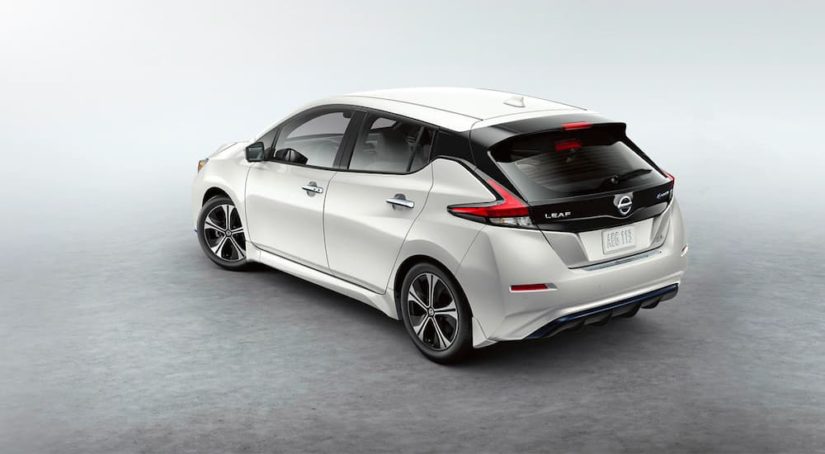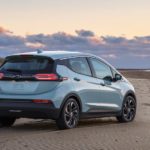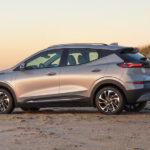When something is so new that it hasn’t been formally adopted by the masses, a few questions begin to form. Who has the cheaper or more performant vehicle? Which manufacturer is the most trustworthy? And more importantly, which vehicle won’t explode in your garage? Well, we’ve got the exact information you’re looking for, and it’s a part of our analysis between the 2022 Nissan LEAF vs 2022 Chevy Bolt EV. The news came out rather recently that Chevy’s vehicle isn’t as good of a deal as it may seem, and there’s one main reason why we say this. Every Bolt EV model that has ever been made has been recalled recently, and the reason this has occurred is that they have been catching fire. Do you know what vehicle hasn’t been catching fire? The 2022 Nissan Leaf.
Electric vehicles are still gaining traction, and every year manufacturers are getting one step closer to an emissions-free future. Because of this, it can’t be taken lightly when a manufacturer makes a mistake as dire as the one that we’ve seen with the Bolt EV models. Keep in mind, Chevy recalled every Bolt model ever made, and it’s not solely limited to the 2022 model. Chevy is working on a fix and has announced that it will replace all the defective battery packs that are at risk of fire, but for now, the Bolt EV remains a potential fire hazard. Alright then, With that out of the way, let’s discuss why the 2022 Nissan LEAF is the best choice as your next or even first electric vehicle.
A Fairly Priced Electric Vehicle
Not only does the 2022 Nissan LEAF have the added benefit of not having a major battery recall, but it also comes in at a lower cost too. There are five available trim levels for the LEAF against the two that Chevy offers. The LEAF starts at an MSRP of $27,400, and the Chevy Bolt starts at $31,000. In an era where electric vehicles are becoming more readily available, these aren’t too egregiously priced, although Chevy’s offering will demand more from your wallet. Nissan’s already off to a whopping head start, and we’re just getting started. Lower priced and less prone to explode? How can it get any better than that? We’ll tell you once we talk about the performance metrics.
Efficiency For Commuters
Electric vehicles are made for efficiency, and if you get one for your daily commute, then you’ll save plenty of money on gas bills. This is because, as the name “Electric Vehicle” implies, it doesn’t run on gasoline. EVs run on batteries combined with electric motors; there’s no engine involved and no fuel being burned whatsoever. How we track the efficiency of an EV is by calculating how many miles you can travel on a single charge. The Nissan Leaf offers two configurations with two battery sizes, starting with a less expensive 40 kWh battery. What you get from this configuration is 147 hp and 236 lb-ft of torque and a range of 149 miles on a full charge.
However, there’s one more battery that’s available for the LEAF that replaces the stock one. This battery is known as the 62 kWh Plus, and it greatly increases performance output and range against the stock option. With the upgraded battery pack, you’ll get 214 hp and 250 lb-ft of torque instead, which is about 43% more horsepower and 6% more torque output than the base battery pack. Even more impressive, this powertrain configuration manages to outperform the 200 horsepower output of the Bolt EV’s sole powertrain. Opting for the upgraded battery will increase your range to 226 miles, a 52% improvement over the base model. For commuting, it doesn’t get better than this, and this is because you can get to and from the workplace in one day, as long it’s not more than 200 miles of distance. When you get home, pop it on the charger and use it again the next day, it’s that simple.
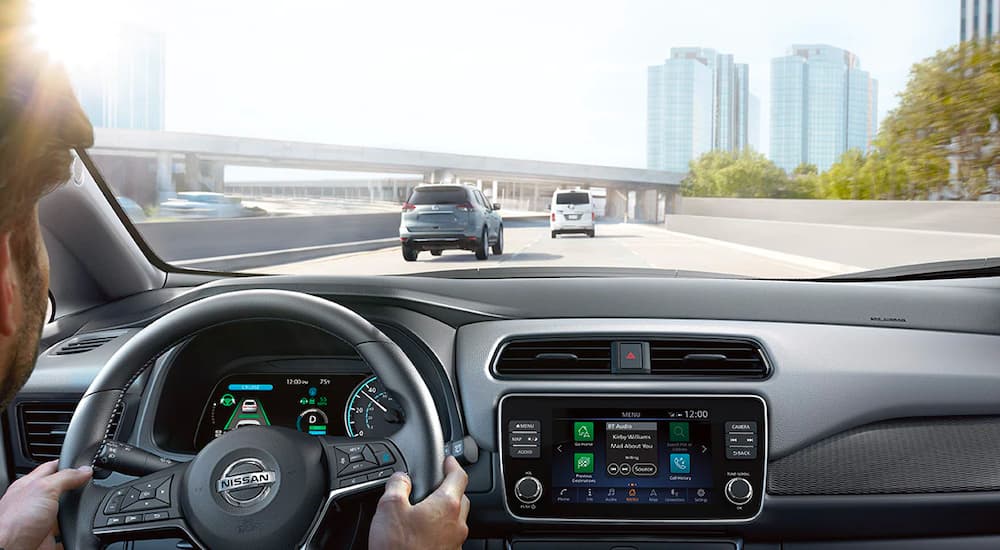
Driving Comfortably
Every commuter knows that an uncomfortable ride can make for a dreadful morning. Electric vehicles such as the 2022 LEAF are built with efficiency and driver comfort equally in mind. One example of this is with heated seats and a heated steering wheel. If you’ve ever driven your vehicle in the dead of winter, you know how cold a vehicle can get, so now you can keep your rear-end warm as well as your hands. Additionally, the 2022 LEAF has Automatic Temperature Control, which allows you to access the settings and program what temperature makes you the most comfortable when driving.
The standard seats will include a 6-way manually-adjustable driver’s seat, but higher-tier trims will replace this with an 8-way power-adjustable seat. This power-adjustable seat also offers 2-way lumbar support, so if you’re prone to getting lower back pain after long commutes, this should sort things out. Cloth comes standard, but leather is an option, of course. Regardless of which trim level you purchase, your front passenger will have a 4-way manually-adjustable seat, but it will be heated if you opt for heated seats. The rear seats offer a 60/40 split, allowing you options between the Leaf’s five-passenger maximum seating capacity and its 30 cubic feet of maximum cargo space.
How else does the 2022 LEAF go above and beyond to create a comfortable environment? Through ambiance. Not only is the LEAF inaudible when driving, but the interior can be filled with high-fidelity audio from your favorite music or podcasts. This is because of the inclusion of Bose premium speakers that you can opt for, which will immerse yourself into your music, and you’ll fall in love with your favorite songs all over again. With this audio setup, you’ll have seven speakers throughout your cabin, and according to Nissan, these speakers are even environmentally friendly since they’re energy-efficient. Sound familiar? The 2022 LEAF is built to be efficient in more ways than one.
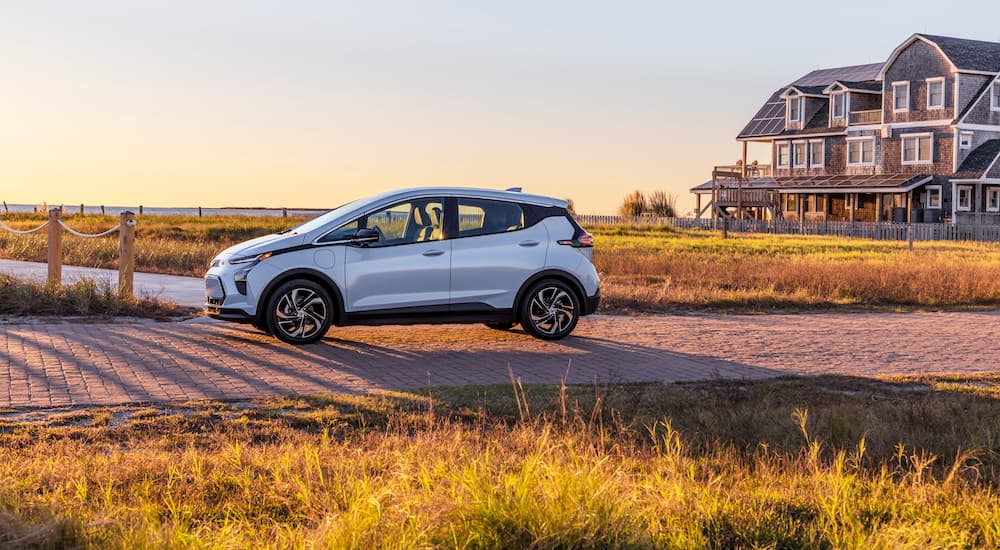
And That’s That
Which EV should you buy? We’ll get right to the point here, don’t get the 2022 Chevy Bolt EV. The reasoning behind this is rather obvious, but just as a reminder, the Bolt EV catches fire. Yes, Chevy is working on ironing out the flaws as we speak, but it only takes one event like this to forever hold the stigma as “the car that catches fire.” The 2022 Nissan LEAF is the full package, and this isn’t just because of an actual reliable battery, but because you’ll save money by avoiding gas stations, and your commute will be comfortable. What else could you want from a commuter vehicle?
Sure, there are a few things that Nissan could add to next year’s model, namely an even more efficient powertrain and perhaps some interior enhancements. However, these limitations are nothing compared to the problems that we’ve seen with the Bolt EV. At least for the time being, avoid Chevy electric vehicles this year, and maybe even next year. We don’t mean to sound so harsh, but the severity of batteries catching fire is something that can’t be left unnoticed. Nissan, you’re doing great, just keep it up and don’t catch fire, and I think we’ll be alright.
